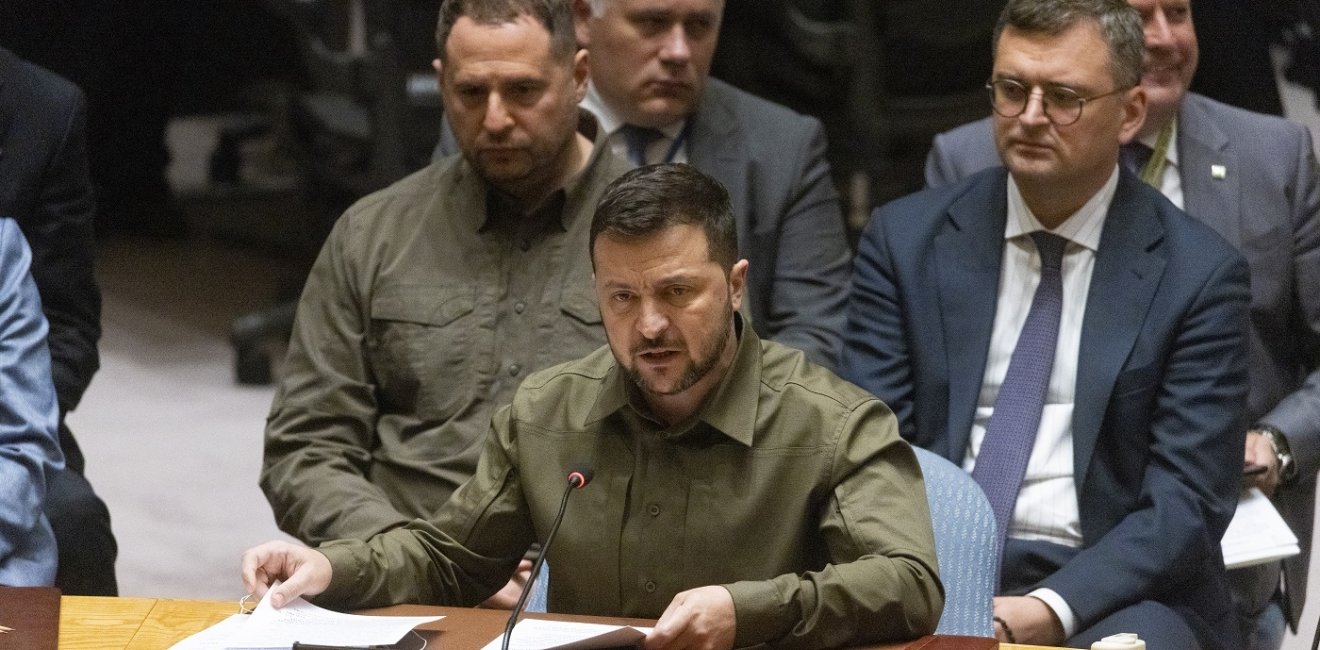Ukrainian President Volodymyr Zelensky began his second wartime visit to the United States with an address to world leaders at the United Nations General Assembly in New York on September 19 before traveling to Washington, DC to meet with audiences at the White House, Congress, and the Pentagon. We asked Kennan Institute and Global Europe Program experts for their analysis of Zelensky’s latest visit to the United States and what it tells us about Ukraine’s foreign policy goals.
Olena Lennon, Adjunct Professor of National Security, University of New Haven
In contrast to his last visit to the US, President Zelensky received a mixed reception during his most recent visit, which was marked by a warm welcome from the White House, but a rather cold reception from some congressional leaders, who have recently been opposing continued American aid for Ukraine. Many commentators were quick to attribute this change of heart to the US's rising doubts about Ukraine’s realistic chances to recapture its territory and America’s ability to sustain the current levels of support.
However, this interpretation of both military and political dynamics is misguided. It is not the change in the US's enthusiasm for supporting Ukraine’s military campaign that explains the seemingly colder reception Zelensky received; rather, it is America’s pre-election infighting, with its tendency to exploit foreign military aid to delineate political positions. After all, despite a toned-down reception, Zelensky’s visit to the US was a success: he secured $325 million in new US aid and—albeit with a small delay—a promise of ATACMS that Ukraine’s political and military leaders have been asking for months.
These developments lead me to make the following three observations about the status of the US-Ukraine relationship. First, despite slow progress in Ukraine’s counteroffensive, the US’s decision to provide Ukraine with longer-range missiles, along with other advanced capabilities, has signaled American leaders’ commitment to helping the Ukrainian military achieve decisive outcomes on the battlefield. By doing so, Western leaders have also signaled that they share the Ukrainian leadership’s assessment that between the two factors constituting a threat—intent and capability—changing Putin’s intent by political means is untenable. Thus, the only way to reduce Russia’s immediate and long-term threat is to continue degrading its military capabilities.
Relatedly, providing Ukraine with capabilities to strike deeper into Russia-held territories may also be indicative of the US’s reassessment of escalation risks. The Biden administration's concerns that Russia might be triggered to deploy a nuclear weapon seem to have diminished.
Lastly, Zelensky’s visit has made it clear that despite the absence of formal security guarantees for Ukraine, the functionality of the US-Ukraine strategic cooperation is strong. However the relationship is codified, sustaining Ukraine’s fight against Russian aggression and preventing Russia from rebuilding its combat power will remain urgent security priorities for the US and other NATO partners.
That said, opposition to continued Ukraine funding from a faction of congressional Republicans will likely gain traction as the US presidential campaign heats up. As a result, the Zelensky administration must not lose sight of the changing domestic environments in partner countries and maintain a strong commitment to foreign aid monitoring and accountability.
Mykhailo Minakov, Senior Advisor, Kennan Institute
President Zelensky’s visit to the US in September had two aims: (1) to demonstrate that the stable majority of UN member states continue supporting Ukraine in the war with Russia, and (2) to ensure that Ukraine-US relations remain at the previously achieved level of partnership. And now that President Zelensky is back to Ukraine, there are heated debates on how these goals were accomplished.
Indeed, both UN speeches of Volodymyr Zelensky, as well as his statements after separate meetings with the leaders of other states during the UN General Assembly, were listened to with great attention by global audiences. Especially Zelensky’s call for UN member solidarity in stopping the Russian aggression and for UN reform that would prevent this state’s aggressive behavior in the future.
Arguably the most important issue raised by President Zelensky at the UN was a reduced version of his peace plan. From his 10-step list, he accentuated two points. First, Russian troops are to be withdrawn from all internationally recognized territory of Ukraine. Second, the Ukrainian government should reestablish control of all Ukrainian regions. After that, peace talks can start, aiming to ensure the stable security of Ukraine and peace in Europe. This offer has seemingly had supportive reactions from the majority of UN member states.
Also, the meeting with Brazil President Lula Da Silva should be paid attention to. President Zelensky discussed the Ukrainian peace plan with a leader who has long held alternative positions regarding the Ukraine-Russia conflict settlement. This meeting was definitely an important step in Kyiv’s dialogue with the Global South.
At the same time, Zelensky’s UN visit was overshadowed by the dispute with the Central European countries over Ukraine’s agricultural export. Especially painful was the exchange of unfriendly statements between Ukrainian and Polish politicians. Even though I’d expect the normalization of relations between Warsaw and Kyiv soon after the Polish elections in October, the current clash demonstrated that despite some strategic achievements of Zelensky in New York, this wasn’t enough to stop deepening certain cracks in the pro-Ukrainian alliance. This is definitely an issue for Kyiv to continue dealing with in the near future.
This visit also showed that the US-Ukraine partnership is developing in a changing environment. A wave of critical publications in the American press—e.g., those on military campaign or corruption—preceded Zelensky’s visit. If in December 2022, the US Congress met the Ukrainian president’s speech with ovations, this September he was not provided with the chance to speak to the House publicly. The political context for the Ukrainian delegation’s trip to DC was very different from the previous one.
Despite that, Zelensky and his team did everything possible to use this change to reaffirm the US-Ukraine partnership. This was visible in the fact that they accepted the enlargement of the DoD audit team and the appointment of the US special representative on Ukraine’s recovery as an opportunity to prove Ukraine’s reliability as a military and economic partner of the US. The Ukrainian delegation organized several meetings with different groups of House members, promoting the message of Ukraine’s need for continued American support. And the meeting at the White House has assured the Ukrainian president that the US remains adhered to the US-Ukraine partnership now and in the future. A new package of military support for the Ukrainian army was a tangible proof of those assurances.
Since the start of the Russian invasion of Ukraine, the sovereignty of Ukraine partially depends on Western and wider international support. The changing international environment demonstrates that there are growing challenges for this support. But Ukrainian leadership finds ways to respond to the challenges and to ensure that international relations increase Kyiv’s chances of successfully defending Ukraine from the Russian aggression.
William Pomeranz, Director, Kennan Institute
President Volodymyr Zelensky ran into the buzzsaw that is US politics on his recent trip to Washington, DC. Praised by President Biden, feted by the Senate, and shunted by the House, Zelensky received the full blast of headwinds that now face US policy on Ukraine. Bipartisanship is not dead, especially in the US Senate, but we are now heading into a presidential election where aid for Ukraine most likely will be a campaign issue. Whether the rest of the world (outside of Europe and a few allies) cares about the fate of Ukraine remains an open question. President Biden reiterated at the UN what carving up Ukraine would mean for the territorial integrity of other nations, even those an ocean away from the battlefield.
The United States is now heading to a government shutdown, a particular American indulgence that will further put off the question of renewed aid for Ukraine. Such actions will be viewed as a further example of US political dysfunction and will only be welcomed by Russia and China in their pursuit of what they now jointly call a new bipolar world.
Zelensky made a compelling speech at the UN as to why support of Ukraine remains vital for global security. As Zelensky stated, Russia has now weaponized energy (including nuclear energy), food, and children during the course of this war. Zelensky ended his speech with a cry for unity to stop Russia’s aggression. Whether the UN, the Global South, and now the US Congress heed this call will determine the fate of Ukraine, and quite possibly the future of the global security architecture. Don’t say that the world was not warned.
Robin Quinville, Director, Global Europe Program
Ukrainian President Zelensky came to New York and Washington knowing the challenge ahead: convince leaders their support for Ukraine is making a difference—and continuing it is essential. Eighteen months of war have made the fight familiar and constant to Ukraine's Western supporters. But while the fight may appear less dramatic, it is no less demanding than it was a year ago. Zelensky knows the West's definition of progress differs from Ukraine's. For Zelensky, undramatic progress counts in a way his impatient supporters do not fully appreciate.
That's why Zelensky focused at the UN on the global costs of the war. It is why he focused on the weaponization of food and of energy, the threat to other countries of further Russian military action, and the kidnapping of Ukrainian children as a violation of agreed UN human rights standards. His message: our fight for existence affects your countries, too.
In Washington, Zelensky needed to persuade divided policymakers on the Hill and in the administration that Ukraine's definition of progress will lead to victory. It is why Zelensky brought in a new defense minister and replaced all six defense deputies shortly before traveling. The message: Zelensky takes US concerns about corruption seriously; Ukraine can fight corruption and Russia at the same time. Zelensky underscored that Ukraine was changing itself—strengthening its governance—to be ready to join the EU and NATO. With Ukraine not receiving an invitation to join NATO in Vilnius, Zelensky will have set his sights on next year’s Washington NATO summit.
As he pressed policymakers on the Hill and in the administration for more, better, swifter war-fighting capabilities, Zelensky made clear that Ukraine has no time to spare. Delayed decisions on what equipment to provide—coupled with delays in delivery—are read by Russia as Western impatience and weakness. If Western countries are impatient for progress, they should step up their speed.
At the UN and in Washington, Zelensky appeared in the uniform he’s worn since the war began. It sends its own message: there can be no "business as usual" until Ukraine succeeds.
Authors

Adjunct Professor of Political Science and National Security, University of New Haven




Kennan Institute
The Kennan Institute is the premier US center for advanced research on Eurasia and the oldest and largest regional program at the Woodrow Wilson International Center for Scholars. The Kennan Institute is committed to improving American understanding of Russia, Ukraine, Central Asia, the South Caucasus, and the surrounding region through research and exchange. Read more


Global Europe Program
The Global Europe Program is focused on Europe’s capabilities, and how it engages on critical global issues. We investigate European approaches to critical global issues. We examine Europe’s relations with Russia and Eurasia, China and the Indo-Pacific, the Middle East and Africa. Our initiatives include “Ukraine in Europe”—an examination of what it will take to make Ukraine’s European future a reality. But we also examine the role of NATO, the European Union and the OSCE, Europe’s energy security, transatlantic trade disputes, and challenges to democracy. The Global Europe Program’s staff, scholars-in-residence, and Global Fellows participate in seminars, policy study groups, and international conferences to provide analytical recommendations to policy makers and the media. Read more

Explore More
Browse Insights & Analysis
Promoting Convergence in US-Brazil Relations

360° View of How Southeast Asia Can Attract More FDI in Chips and AI

Israel Escalates Attacks in Gaza: What’s Next?

